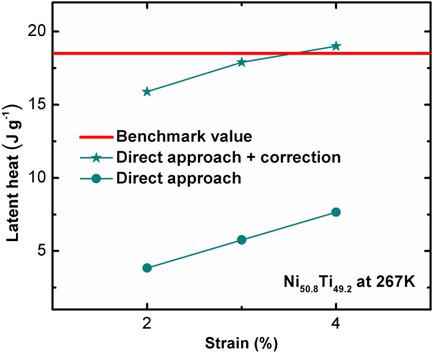当前位置:
X-MOL 学术
›
Energy Technol.
›
论文详情
Our official English website, www.x-mol.net, welcomes your
feedback! (Note: you will need to create a separate account there.)
Utilizing Incomplete Phase Transformation to Characterize Elastocaloric Effect of Shape Memory Alloys
Energy Technology ( IF 3.6 ) Pub Date : 2020-07-11 , DOI: 10.1002/ente.202000322 Zhe Liu 1 , Jierong Liang 2 , Chaiyi Huang 1 , Tingxun Li 1
Energy Technology ( IF 3.6 ) Pub Date : 2020-07-11 , DOI: 10.1002/ente.202000322 Zhe Liu 1 , Jierong Liang 2 , Chaiyi Huang 1 , Tingxun Li 1
Affiliation

|
This study reports a correction to assist the elastocaloric effect characterization of shape memory alloys and obtain the latent heat of stress‐induced martensitic transformation. The incomplete phase transformation analysis (IPTA) correction is developed based on the assumptions of linear transformation plateau of stress–strain and identical heat capacities for austenite and martensite phases. Taking Ni50.8Ti49.2 alloy as a demonstration, an integrated test rig is built to validate IPTA correction and study the heat leak effect. Using water as heat transfer fluid and heat leak compensation it is possible to further improve the accuracy of imposing IPTA correction. The predictions of latent heat from direct and indirect approaches with IPTA correction are validated from the experimental data. The required minimum martensitic phase fraction is only 10–20% when applying the IPTA correction, compared with 84–93% in traditional approaches. The IPTA correction extends the precondition of complete transformation to incomplete transformation in elastocaloric characterization.
中文翻译:

利用不完全相变表征形状记忆合金的弹性热效应
这项研究报告了一种校正方法,可帮助表征形状记忆合金的弹性热效应并获得应力诱发的马氏体相变的潜热。不完全相变分析(IPTA)校正是基于应力-应变线性转变平稳期以及奥氏体和马氏体相具有相同热容的假设而开发的。以Ni 50.8 Ti 49.2以合金为例,建造了一个综合测试台来验证IPTA校正并研究热泄漏效应。使用水作为传热流体并进行热泄漏补偿,可以进一步提高实施IPTA校正的精度。实验数据验证了采用IPTA校正的直接和间接方法对潜热的预测。采用IPTA校正时,所需的最小马氏体相分数仅为10–20%,而传统方法为84–93%。IPTA校正在弹性热表征中将完全转换的前提扩展到了不完全转换。
更新日期:2020-09-05
中文翻译:

利用不完全相变表征形状记忆合金的弹性热效应
这项研究报告了一种校正方法,可帮助表征形状记忆合金的弹性热效应并获得应力诱发的马氏体相变的潜热。不完全相变分析(IPTA)校正是基于应力-应变线性转变平稳期以及奥氏体和马氏体相具有相同热容的假设而开发的。以Ni 50.8 Ti 49.2以合金为例,建造了一个综合测试台来验证IPTA校正并研究热泄漏效应。使用水作为传热流体并进行热泄漏补偿,可以进一步提高实施IPTA校正的精度。实验数据验证了采用IPTA校正的直接和间接方法对潜热的预测。采用IPTA校正时,所需的最小马氏体相分数仅为10–20%,而传统方法为84–93%。IPTA校正在弹性热表征中将完全转换的前提扩展到了不完全转换。











































 京公网安备 11010802027423号
京公网安备 11010802027423号